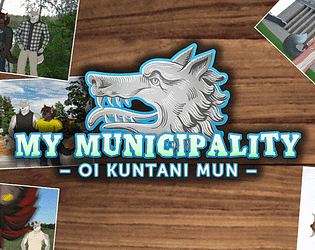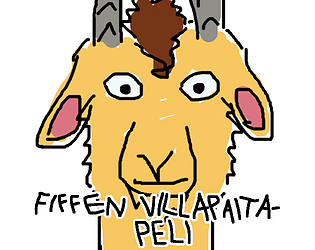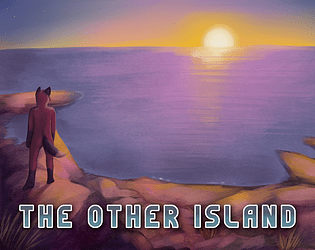The presentation consists of less than the bare (/bear) essentials; you get no audio, one background and one sprite only, and nothing to show the timeskips visually or otherwise break up the monotony of staring at the same thing for the entire game. Luke isn't even hidden when he's not present in the scene, and the final transformation is pretty blandly realized. I do realize that the chamber play-esque premise doesn't translate easily into the most formally exciting visual novel, but if there is nothing the presentation can do to enhance the story, is this the right medium for it?
Similarly, the writing feels like it struggles to fit into the expectations of the format. As a recurring issue that hurts the flow a lot, lines are often broken across multiple text boxes with seemingly no rhyme or reason – not good, since they're the VN equivalent of paragraphs (with the added restriction that you can only see one at a time) and should express complete thoughts. There are also a lot of dialogue tags, which feels awkward for the same reason.
When you get past that, I think the prose has some weak points in general. Besides a fair amount of typos and other mechanical errors, it comes off as hastily edited due to frequent problems with syntax and sentence structure, often stumbling upon wordy, clunky ways to say something. For instance: "If I had to guess, the people I was around last time I was awake most have also been ones who enjoy tech." The "[when] I was awake" is sort of unnecessary to specify in context, it's unclear what "most" is referring to, and I don't get the reason for the tense shift in the last part since the events being referred to are firmly in the past.
Another example: "He then turns around and sees me trying those various movements in the middle of one where I have to remind my extension to stay an arm and not an amorous limb." I'm having a hard time grasping what is happening here in terms of grammar – are some commas that could clarify things missing, or something?
As far as style goes, word choices are definitely an area of improvement. There's a lot of noun language around – the game often goes for weak verbs and fills in the meaning via unwieldy nouns and phrases ("current-day politics avoidance", "transphobia got stronger and bigger, with more and more presences"). Adverbs feel a little extraneous at times, too ("I stare intently and furiously at the screen"). I guess there's no need to look further than the itch page for examples – surely there's a more poetically compelling way to say it than "a not great political situation"?
I will say that the plot itself is not conceptually bad or anything, but the execution feels bumpy in a couple of ways. The pacing is burdened by how slowly the game lets the reader in on what's happening, not to mention that there are a fair amount of unresolved questions regarding how this situation came to be that the characters feel strangely reluctant to think about. Who's Luke, and where did he get this alien in a jar? Why is it on Earth in the first place? It feels like you're reading a rough outline of how the story might go down instead of what two people would actually do in this situation.
Modulation of tone feels pretty shaky, too. After what is ultimately a relatively low-key story with hints of romance, the fantastic premise notwithstanding, the game suddenly takes a hard turn towards horny and then concludes with what is basically an origin story for a superhero. Both late-game shifts could use some stronger setup; in the moment, they feel baffling and difficult to connect with emotionally.
In total, there are a lot of first project-isms that could be ironed out, and I think the writing doesn't quite hit the mark in style or content. Hopefully all this feels like useful feedback for either polishing the game or for future projects. (P.S. why is there only a Windows build when the game is made in Ren'py?)




